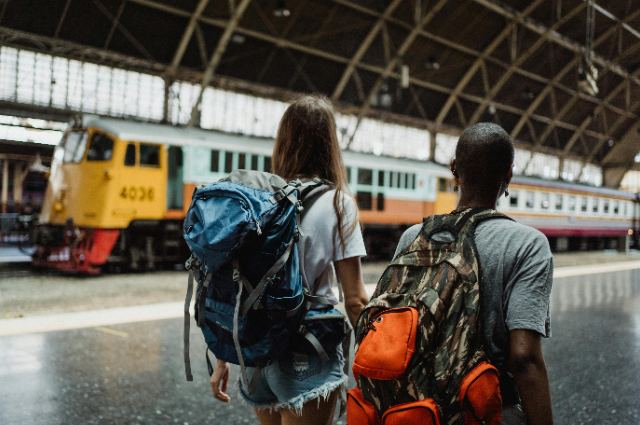
Trains. I don’t know why, but trains have always felt like magic. There’s something in the chug of wheels, the sway of the carriage, the smell of the station, that makes me stop thinking in normal ways. When I was a child, going home from school meant trains. Or visiting relatives in Kerala. The stations smelled of tea, dust, oil from snacks, sometimes a faint metallic smell, and it all hit me at once. I could never pinpoint one scent. It was chaos and calm, altogether.
I remember holding my ticket once, my fingers tracing the edges. It was like holding a little promise. A promise that I’d see the world move. I’d sit by the window and watch. Coconut trees. Paddy fields. Cows. Shops. People. Everything blurred in streaks of green and brown. Time was not minutes, not hours. Time was the train, and the train was everything.
Indian trains are… messy. Beautifully messy. A microcosm of the country. Sleeper class. AC compartments. People carrying entire lives in backpacks, plastic bags, and sometimes suitcases too big to even hold properly. Students laughing, families huddled together, old couples holding hands. Vendors weaving between seats, shouting “chai! Samosa! Idli!” like it’s the most normal thing. And somehow, it is. Somehow, it makes sense.
I like the unpredictability. Seats are never guaranteed. Announcements are sometimes incomprehensible. Trains late, trains early. You learn patience. You learn that five minutes can feel like eternity, that hours can fly if you’re looking out at the horizon and thinking about everything and nothing at once. The pauses at stations—sometimes long enough to breathe, sometimes too short—feel like punctuation in a sentence that never ends.
And the people. Oh god, the people. There’s this strange intimacy on trains. You can see lives brushing against each other for hours. Maybe the person next to you is a stranger now, but for eight, ten hours, they are your companion. They laugh, they cry, they eat, they sleep, and you share it all in silence. There’s this weird democracy to it. Everyone is equal in transit. But also, not. Sleeper vs AC. Upper caste vs lower caste. Money talks, privilege sneaks in quietly, even here.
Food on trains is… another world. I remember samosas. Idlis. Chai. Bananas are sometimes wrapped in old newspaper. Kerala trains—banana chips, steaming hot parottas, hot tea with milk that’s just slightly sweetened. And eating while the train rocks. I don’t even know how to explain it. It’s not just taste. It’s movement. Smell. Sound. It’s eating life while life itself moves past your window.
History seeps through the trains, too. Kerala, my home, was part of the Madras Presidency. The British, Portuguese, and Dutch all came for spices, money, and power. The trains came later, but they carried the memory of that extraction, that hunger, that ambition. And today, you ride, and maybe you don’t feel it, but it’s there. In the old coaches. In the squeaky doors. In the whistle that echoes for miles. It’s the sound of colonization turned ordinary. Turned domestic. Turned essential.
There is something meditative about trains. Even when crowded, you can find a corner, a seat, a space. Long journeys let me think. I write in my head. Plan. Dream. Sometimes cry silently. Sometimes just stare. The rhythm of the wheels becomes a metronome for thoughts. Thoughts that make no sense, that make all sense.
I remember my first long solo journey. I was fifteen. I had a ticket, a bag, and no one to look after me. The train left the station, and I realized—I could just sit here and be, completely alone in the middle of everything. Not lonely. Not sad. Just… present. That was the first time I felt it: the train as a moving meditation.
Modern trains, bullet trains, electrification, faster engines—they are all impressive. But the old trains—the ones that creak, that smell faintly of oil and dust, that whistle like they’re sighing—those are the ones that stay with you. I don’t want efficiency. I want magic. I want to feel the vibration under my feet, the wind from the half-open window, the smell that doesn’t have a name.
And you notice little things. The way strangers offer a seat to an old lady. The way a kid giggles when the train slows on a bridge. The way two people argue over a cup of chai. Life condensed in a carriage, moving across kilometers, across time.
Sometimes I think of impermanence. People get off. Friends made disappear after one journey. Luggage collects dust. Posters peel. Seats scratch. The tracks stay. Invisible lines that never end. Connecting lives. Quietly. Patiently. Endlessly.
A train is not just for travel. It is a lesson. It teaches patience. Empathy. Awareness. It teaches that time is not linear. That life is shared. That solitude can coexist with intimacy. That history can move with you. That chaos is sometimes beautiful. That waiting is part of living.
So I write this as the train moves, and the landscape slides past. Chug-chug. Click-clack. My thoughts rise and fall like the compartments. The train moves. I move. And for a few hours, the world feels contained, complete, yet infinite. And maybe that’s why I love trains.
References / For Further Reading
- History, infrastructure, modernization: https://economictimes.indiatimes.com
- Kerr, Ian J. Engines of Change: The Railroads That Made India. Oxford University Press, 2007.
- "How Trains Shaped the Indian Economy." The Economic Times: https://economictimes.indiatimes.com
- “The Sociology of Train Travel.” Journal of Transport History: https://journals.sagepub.com
- Environmental Impact of Rail vs Road Transport in India: https://www.researchgate.net
